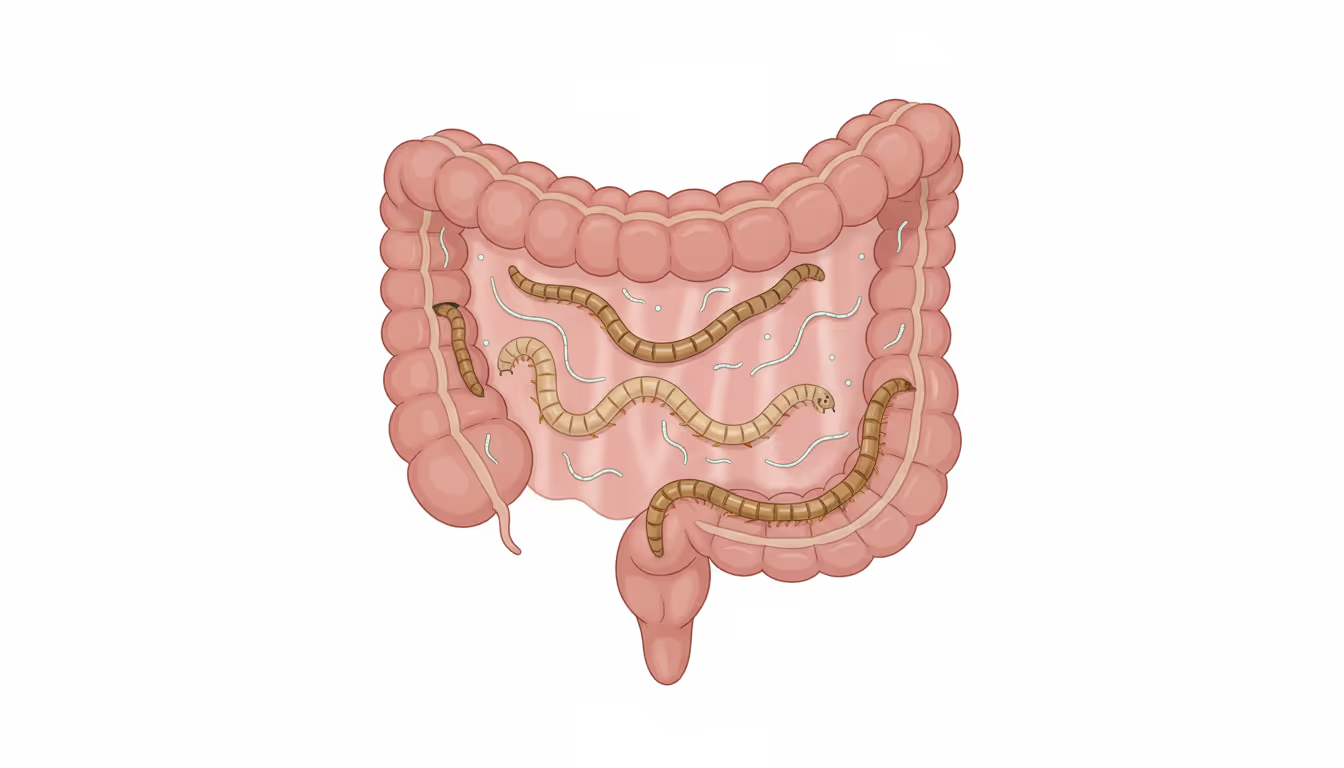
Parasitic Worms:A parasitic worm is a type of organism that causes disease by living on or inside a human or another animal, deriving nourishment from its host. Parasites like lice reside on human skin, while bacteria and other microorganisms can exist either on or within humans. Helminths, or parasitic worms, specifically inhabit the human body. Their eggs can contaminate food, water, air, feces, pets, wild animals, and objects such as toilet seats and door handles. These eggs enter the human body through the mouth, nose, or other openings. Once inside, they typically settle in the intestines, where they hatch, grow, and multiply, although sometimes they can affect other areas of the body.Diagnosing helminth infections in humans usually involves a physical exam, stool analysis in a laboratory, and occasionally other tests. Treatment generally includes the use of effective anti-parasitic medications known as vermifuges, which eliminate the worms. Preventative measures include frequent handwashing, regular cleaning of bathrooms and kitchens, and thoroughly cooking foods prone to infestation, such as beef, pork, sausage, and bear meat. If possible, water supplies should be treated with chlorine.Common helminths and the issues they cause include:1. **Roundworms**: These worms hatch and reside in the intestines. They typically enter the body through contaminated water or food or via unwashed hands touching the mouth. Symptoms may include fatigue, weight loss, irritability, poor appetite, abdominal pain, and diarrhea. Medication can cure the infection in about a week, but without treatment, more severe conditions may develop.2. **Pinworms**: Also known as seatworms or threadworms, pinworms primarily live in the intestines. They can enter the body through the anus, inhaled air, or by mouth from contaminated fingers. Symptoms include anal itching, pale skin, and stomach discomfort. In females, they may lead to additional irritation and itching. Pinworms are generally not serious and can be treated effectively with medication within days.3. **Trichina spiralis**: This worm, responsible for trichinosis, inhabits the intestines. Infection usually occurs through raw or undercooked pork, sausage, or bear meat. Once ingested, the eggs hatch in the intestines and migrate through the bloodstream and lymphatic system. Early symptoms include vomiting, diarrhea, and abdominal cramps, progressing to high fever, facial swelling, and muscle pain. Without treatment, the worms can invade muscles, the heart, and the brain, potentially leading to death. Treatment with drugs like thiabendazole, alongside bed rest and medical supervision, can result in recovery, which may take several months. Diagnosis sometimes requires a muscle biopsy.4. **Tapeworms**: These worms reside in the intestines and usually enter the body through raw or undercooked beef. While symptoms are often absent, some individuals may experience abdominal pain, fatigue, weight loss, and diarrhea. Medications typically cure the infection within days.5. **Flukes**: Flukes can inhabit various parts of the body, such as the intestines, liver, and veins. They mature in freshwater snails before entering human hosts through the skin during activities like swimming or bathing in contaminated water. Infected individuals can further contaminate water through urination or defecation. Though many infected individuals show no symptoms, some may experience rash, itching, muscle aches, cough, chills, and fever. Repeated infections can lead to damage to organs like the liver, bladder, intestines, and lungs. In rare cases, flukes can invade the brain, causing seizures and other severe symptoms. Fluke-related diseases, known as schistosomiasis or bilharziasis, are primarily found in parts of Africa, South America, the Caribbean, the Middle East, China, and the Philippines.The term "helminth" originates from the Greek word "helmins," meaning worm. Helminthology is the scientific study of these parasitic organisms.




